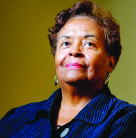 Civil rights activist Joyce Ladner encouraged attendees to decide upon a mission and satisfy it at the Martin Luther King Jr. Convocation on Jan. 19.
Civil rights activist Joyce Ladner encouraged attendees to decide upon a mission and satisfy it at the Martin Luther King Jr. Convocation on Jan. 19.
Ladner, the primary speaker at the convocation, delivered her speech to an audience of students, faculty and guests that nearly filled Weaver Chapel.
“Each generation must find a mission and either fulfill it or betray it,” Ladner said. “What is your mission? How are you fulfilling the promise that Dr. King made to you?”
Ladner’s speech, entitled “The Civil Rights Movement Then and Now,” detailed much of her life as a civil rights activist leader and of her experience growing up as a black woman in the deep south.
She also touched on her experiences with prominent civil right leaders, such as James Meredith and Martin Luther King Jr., whom she met on several occasions.
“Often, Dr. King is seen as a historical figure who has been immortalized, almost larger in death than he was in life,” Ladner said. “But for me, he was a living, breathing human being who spent his life fighting for all of us to have rights that were guaranteed by the Constitution.”
Throughout the speech, she detailed her experiences as being a staffer sent by the Student Nonviolent Coordinating Committee to organize the March on Washington in the summer of 1963, which she described as the most important event of her life.
She not only helped to organize the march, but she was also on the stage when MLK delivered his “I Have a Dream” Speech.
Additionally, she spoke of her involvement over the years in sit-ins, voter registration campaigns, demonstrations and marches, and she described how she was expelled from Jackson State
University because of her involvement in activist campaigns.
“Through her activism, Dr. Ladner embodies the phrase ‘actions, not words,’” said Isaac Cason, ’16, president of Concerned Black Students.
In addition to discussing her activism, Ladner spoke of the difficult times that occurred throughout her life, such as the deaths of Emmett Till, MLK and the four innocent girls who were killed in a bombing of a Baptist church in Birmingham.
“Hearing Dr. Ladner speak about her first-hand experiences gave me a whole new perspective on the movement, though, and opened my eyes to some of the problems faced by African Americans that aren’t in textbooks,” Kyla McGee, ‘19, said. “She really emphasized the fear of the protesters and the brutality of the police.”
Ladner closed her speech by connecting Civil Rights movements of the past to issues that society faces today, such as police brutality and immigration policies.
“These are your civil rights issues,” Ladner said. “[During my time] we knew who the enemy was. Today, the issues are infinitely more complex. The question is: what will you do about it?”





